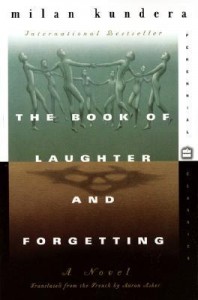 Milan Kundera discusses variations in The Book of Laughter and Forgetting: “Variation form is the form in which concentration is brought to its maximum; it enables the composer to speak only of essentials, to go straight to the core of the matter.” He goes on to write, “This book is a novel in the form of variations. The various parts follow each other like the various stages of a voyage leading into the interior of a theme, the interior of a thought.” The form he chooses to use for this book, the form of variations, provides the majority of the structure for the novel.
Milan Kundera discusses variations in The Book of Laughter and Forgetting: “Variation form is the form in which concentration is brought to its maximum; it enables the composer to speak only of essentials, to go straight to the core of the matter.” He goes on to write, “This book is a novel in the form of variations. The various parts follow each other like the various stages of a voyage leading into the interior of a theme, the interior of a thought.” The form he chooses to use for this book, the form of variations, provides the majority of the structure for the novel.
Without acknowledging this structure, the sections of the book are only loosely related through theme or geography. Mirek is a Czech writer who in visiting a former lover leaves his political writings and letters at home exposed and vulnerable to seizure by the secret police. Marketa and Karel are being visited by their lover, Eva, and Karel’s forgetful mother, Mama. Mama helps Karel remember a childhood attraction to his mother’s friend, a woman who reminds him of Eva, and this one clear memory reconciles him with his mother. Two American girls discover the power of laughter in a small French town. The narrator recounts a story of clandestinely writing a column and his musings on circles (having stepped outside and being unable to rejoin). Then there is Tamina, who is by Kundera’s admission, the focus of the novel. She fled Prague with her husband who died tragically soon after. She longs to have the letters and journals she left behind to relive their life together. She allows Hugo to have sex with her, but he never retrieves the letters. Kristyna is an older woman from a small town who has an unconsummated affair with a student poet. Tamina is spirited away by a man who asks her to “forget your forgetting” and then she travels over water to a place where children molest her and she cannot swim home. Jan goes to a beach house where everyone has sex with everyone.
Themes emerge, laughter and forgetting of course, but also litost, dangerous papers, meaningless sex. The characters sometimes show up again, but never outside of their original context. Their lives never physically overlap with anyone from other sections. What do recur are variations on themes. Papers are lost and it turns out the value wasn’t contained in the papers themselves, but in the writer’s memory. Characters grow close through their connections and shared experiences, not through sex. Sex is itself meaningless or sometimes a violation. Some steps, whether leaving your country or giving up on life, cannot be retraced (the circle cannot be re-entered).
To be honest, the book was a bit over my head, and I struggled to see the connections between the sections. I did enjoy, though, the way it made me look at the themes more closely. Because the characters were not related to each other and did not recur outside of their own contexts, my attention was directed to the elements that recurred and I started to make meaning from those connections. I don’t think I would go this far in my own work, I am still married to a more traditional narrative, but I can see how Kundera allowed me as a reader to use the natural human tendency to seek meaning to engage me in this work. I am interested in seeing whether themes can take on the same importance without removing as much of the connection between the characters and the reader as Kundera has.
If this review made you want to read the book, pick up a copy of The Book of Laughter and Forgetting from Bookshop.org. Your purchase keeps indie booksellers in business and I receive a commission.